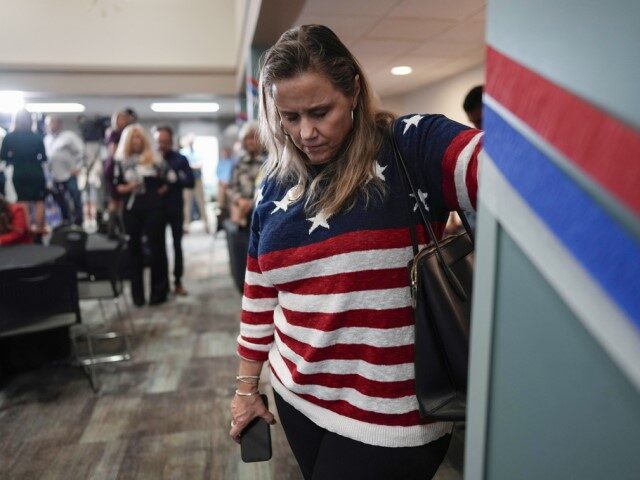Ohioans codified the supposed “right” to abortion in their state constitution Tuesday night, representing another state-level victory for pro-abortion activists pushing ballot measures following the overturning of Roe v. Wade last year.
Polling locations in the Buckeye State closed at 7:30 p.m. E.T. Dave Wasserman of the Cook Political Report called the election nearly an hour after polls closed, with 60 percent voting in favor of the amendment, called Issue 1, and 40 percent voting against it with 27 percent of votes counted, New York Times projections show.
I've seen enough: in a victory for the pro-choice side, Ohio Issue 1, a measure to establish a right to an abortion in the state constitution, passes.
— Dave Wasserman (@Redistrict) November 8, 2023
As Issue 1 changes the state constitution and takes precedence over laws passed by the state legislature, it is likely irreversible — and can only be overturned by another ballot measure. Its passage also comes after an amendment that would have raised the threshold to pass amendments to the state constitution from 50 percent plus one to 60 percent failed in an August special election. That amendment would have made it more difficult for the abortion amendment to pass.
Pro-abortion groups pushing the amendment dumped significant sums into framing a “yes” vote on Issue 1 as a vote for “freedom,” and invoked conservative imagery, opposition to government overreach, and mentions of “faith” and “family” to convince Ohioans to support the killing of the unborn. Pro-abortion groups successfully employed a similar strategy in the 2022 midterms, when abortion was on the ballot in states like Kansas and Michigan.
Critics of the ballot amendment urgently warned leading up the election that the measure is about much more than abortion and could be used to decimate parental rights, lead to abortion throughout pregnancy, gruesome partial-birth abortions, and even allow minors to pursue sex-change procedures. Some constitutional scholars, as well as Ohio Gov. Mike DeWine (R), pointed to the amendment’s broad language — specifically the use of the term “individual” — to argue that the amendment could be used to allow minors to obtain abortions without parental consent.
Left-wing fact-checkers have asserted the amendment will not impact parental rights, partial-birth abortions, or eventually allow minors to pursue sex change drugs and procedures without parental consent. In a televised debate on the amendment, pro-abortion activist Desiree Tims declined to clarify the broad language of the measure, instead repeatedly claiming that Issue 1 is simply about “removing politicians” from reproductive decisions and restoring Roe v. Wade.
But when local media questioned the ACLU of Ohio about whether the language of the measure would undo parental consent and notification laws, the organization vaguely indicated that those laws would not stand if the amendment passes.
“When you pass a constitutional amendment, it doesn’t just automatically erase everything and start over. But it would mean that laws that conflict with it cannot be enforced, should not be enforced,” said Jessie Hill, an attorney for the ACLU of Ohio.
Ohio Attorney General Dave Yost published his own legal analysis of Issue 1 and found that while the language makes no mention of parental consent laws, “the parental-consent statute would certainly be challenged on the basis that Issue 1 gives abortion rights to any pregnant ‘individual,’ not just to a ‘woman.”’ He also said the regulation of post-viability abortions would be “technically possible but would be ineffective” and said the use of the broad term “reproductive decisions” leaves “outcomes uncertain” around transgender drugs and procedures for minors. Yost further said the amendment would overturn laws banning partial-birth abortions in the state.
The ACLU of Ohio is responsible for crafting the broad original language of the abortion amendment, along with other groups, such as Planned Parenthood. The amendment, as voted on by Ohioans, would “establish in the Constitution of the State of Ohio an individual right to one’s own reproductive medical treatment, including but not limited to abortion.”
The ballot measure, put forward by Ohioans United for Reproductive Rights, a coalition comprised of far-left groups such as URGE, ACLU of Ohio, and Planned Parenthood Advocates of Ohio, would also:
- Create legal protections for any person or entity that assists a person with receiving reproductive medical treatment, including but. Not limited to abortion;
- Prohibit the State from directly or indirectly burdening, penalizing, or prohibiting abortion before an unborn child is determined to be viable, unless the State demonstrates that it is using the least restrictive means;
- Grant a pregnant woman’s treating physician the authority to determine, on a case-by-case basis, whether an unborn child is viable;
- Only allow the State to prohibit an abortion after an unborn child is determined by a pregnant woman’s treating physician to be viable and only if the physician does not consider the abortion necessary to protect the pregnant woman’s life or health; and
- Always allow an unborn child to be aborted at any stage of pregnancy, regardless of viability, if, in the treating physician’s determination, the abortion is necessary to protect the pregnant woman’s life or health.
The pro-abortion side massively outraised opponents of Issue 1. Campaign filings from Ohioans United for Reproductive Rights shows they brought in nearly $29 million from donors since Sept. 8, the Associated Press reported. Meanwhile, pro-life groups rallying against the measure have raised just under $10 million in the same period.
The largest donations backing the abortion amendment since Sept. 8 “came from out-of-state groups,” including $5.3 million from Arabella Advisors’ Sixteen Thirty Fund, a D.C.-based dark money group, the report states. The “yes” campaign also received $3.5 million from the New-York-based Open Society Policy Center, which is associated with billionaire left-wing Democrat donor George Soros. The American Civil Liberties Union (ACLU), also based in New York, gave the pro-abortion coalition $2 million, according to the report.
Katherine Hamilton is a political reporter for Breitbart News. You can follow her on X @thekat_hamilton.

COMMENTS
Please let us know if you're having issues with commenting.